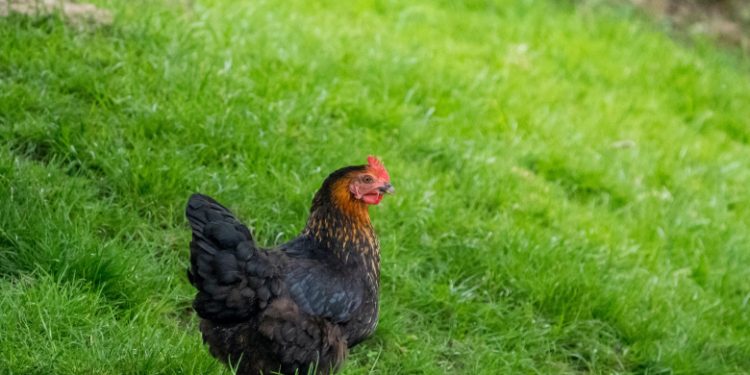The Harco is a beautiful, very prolific hen resulting from a cross between the Rhode Island Red breed and the Plymouth Rock breed. This black hen with a golden neck is very interesting in a chicken coop, both for its beauty and for its productivity. Like the red hen, she lays about 300 eggs a year, enough to enjoy them in all possible forms. If your chicken purchase is primarily egg-driven, this is the one for you.
Physical peculiarities
Not to confuse the Harco, know that it does not have feathers on the legs, unlike the Marans. Its neck is short and wide. The legs are long and smooth.
Size of the eggs: from 45 to 65g at term (72 weeks), slightly brown when those of the Marans are darker
Plumage: red/copper camail and black plumage with green reflections.
Eyes: orange irises.
Beak: gradient, from dark gray to beige at the tip of the beak.
Crest: simple, red.
Chest: developed.
Mumps: red.
Tarsi: rather thin and long, creamy beige in colour. Four toes, yellow or gray.
Behavior and character
Harco breed hens have a calm and affectionate temperament. They also have good contact with other animals and will be very happy even in an already crowded barnyard. Docile, they are not afraid of their owner. These casseroles also have a high tolerance for stressful situations, which don’t even affect their productivity. If you have to transport her in a crate or move house, she will adapt quickly.
Very sociable, this chick does not conceive of living alone. So try to adopt several, even of different breeds.
Feed
The Harco does not need a specific diet, the classic pellets for laying hens are perfectly suited to it. It is a hen that resists lack well, but this is obviously not a reason to deprive it of food. You will of course have to provide him with 100 to 120g of food per day and per hen. This chick is also a good explorer who will not hesitate to peck in the grass to enhance its diet with small shoots and insects.
Reproduction
The Harco hen starts laying at about 5 months, which ranks her about average in terms of fertility. Despite the crossbreeding from which it comes, the Harco has retained its maternal instinct. She is a good brooder who will bring fertilized eggs to hatch and be protective of her chicks.
The Harco rooster is on the other hand very active, do not consider it unless you have at least 7 hens in your hen house, at the risk of exhausting them.
That said, the Harco hen quickly loses her fertility. This breed having been created for industrial purposes, its egg production is very important, but only lasts a maximum of 2 years at full speed and then declines very quickly.
Health
This dear hybrid chicken has a strong resistance to frost as well as immunity to many diseases affecting hens. She is resistant by nature and will accompany you for a long time, even if she will stop laying eggs fairly quickly.
Of the shortcomings, we note only the fact that the plucking process is longer than that of other breeds, and therefore the chicks need to be kept warm longer.
Place of life
Hens like to live in a community, and this is particularly true with the Harco. If you plan to adopt a casserole of this breed, try to take at least 3, in addition to making her happy, you will have eggs for the whole family!
It is a robust hen that resists heat well, but especially the great cold, the fact that it comes from Hungary may have something to do with it. A classic chicken coop with a small grassy run is therefore perfectly adequate.
However, make sure that the temperature in the chicken coop does not drop below 10°C. Once again, adopting several seems to be the ideal solution, as a very social hen, the Harco will have no trouble sharing its perch with several of its congeners.
Breed History
The precise origins of the Harco are discussed. Some think it was born in England, while for others it appeared in the United States. Anyway, the breed was created in one of these two countries to then be sold just after in Hungary.
A modern cross, its genome is developed by a Hungarian company called Babolna Tetra. She is an F1 hybrid type hen. Unlike most breeds acclaimed by amateur breeders, the Harco is not a rustic hen from a particular region and therefore owes its birth to the food industry. She was born from a cross between the Rhode Island Red and the Plymouth Rock breed for the purpose of productivity and ease of breeding.












